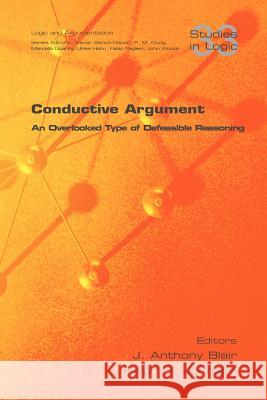Conductive Argument. an Overlooked Type of Defeasible Reasoning » książka
Conductive Argument. an Overlooked Type of Defeasible Reasoning
ISBN-13: 9781848900301 / Angielski / Miękka / 2011 / 310 str.
In Challenge and Response: Justification in Ethics, Carl Wellman coined 'conduction' and 'conductive' to name a distinctive kind of defeasible reasoning and argument-neither deductive nor inductive-often used in forming and justifying ethical judgments, classifications and judgments employing criteria. Some informal logicians have used the concept in their textbooks, but conductive reasoning and argument have hitherto received little scholarly attention. Conductive Argument is a comprehensive introduction to the theoretical issues related to conductive argument and reasoning. With papers by leading argumentation scholars, it is the product of a symposium, sponsored by the Centre for the Study of Reasoning, Argumentation and Rhetoric at the University of Windsor, organized to examine the concept of conductive argument. Topics covered include: historical antecedents of the concept of conduction, problems with Wellman's account of conduction, various conceptualizations of conductive argument and attendant problems, whether conductive arguments constitute a distinct class, the structure of conductive arguments, their domain(s), how they might be diagrammed, how they might be evaluated, and case studies of conductive arguments. Conductive argument deserves the close attention of theorists of reasoning and argumentation, communication and debate, informal logic and logic in general.
In Challenge and Response: Justification in Ethics, Carl Wellman coined conduction and conductive to name a distinctive kind of defeasible reasoning and argument-neither deductive nor inductive-often used in forming and justifying ethical judgments, classifications and judgments employing criteria. Some informal logicians have used the concept in their textbooks, but conductive reasoning and argument have hitherto received little scholarly attention. Conductive Argument is a comprehensive introduction to the theoretical issues related to conductive argument and reasoning. With papers by leading argumentation scholars, it is the product of a symposium, sponsored by the Centre for the Study of Reasoning, Argumentation and Rhetoric at the University of Windsor, organized to examine the concept of conductive argument. Topics covered include: historical antecedents of the concept of conduction, problems with Wellmans account of conduction, various conceptualizations of conductive argument and attendant problems, whether conductive arguments constitute a distinct class, the structure of conductive arguments, their domain(s), how they might be diagrammed, how they might be evaluated, and case studies of conductive arguments. Conductive argument deserves the close attention of theorists of reasoning and argumentation, communication and debate, informal logic and logic in general.











